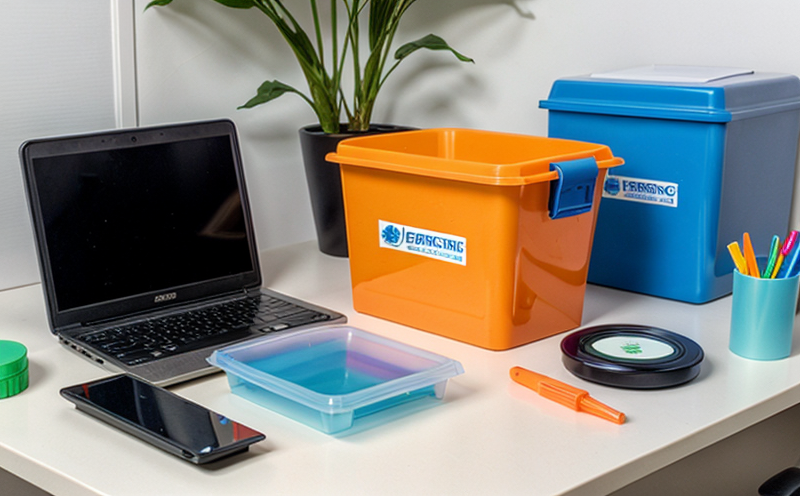IEC 60243 Dielectric Strength Testing of Office Plastic Insulation
The IEC (International Electrotechnical Commission) Standard 60243 is a crucial guideline for ensuring the safety and reliability of insulating materials used in electrical equipment. This standard specifically addresses dielectric strength testing, which measures an insulating material's ability to withstand high voltage without breaking down or failing.
In the context of office plastics, such as those found in stationery products like pens, rulers, and folders, ensuring that these materials meet stringent insulation standards is paramount. The purpose of dielectric strength testing is not only to protect users from electrical hazards but also to guarantee product durability and performance over a wide range of operating conditions.
When performing IEC 60243 tests on office plastic insulations, the process involves subjecting the specimens to progressively higher voltage levels until they break down. This breakdown can be indicated by a flashover or an increase in current that exceeds predefined limits. The test parameters are carefully controlled to simulate real-world scenarios where insulation may be subjected to high voltages.
Specimen preparation is critical for accurate testing results. Samples must be cut from the plastic sheets used in office products, ensuring they have uniform dimensions and thicknesses. The specimens should also be free from defects or surface irregularities that could affect test outcomes. After preparation, these samples are mounted onto electrodes within a controlled environment to ensure consistent moisture content.
The testing apparatus typically consists of a high-voltage generator capable of delivering precise voltage increments up to the required dielectric strength levels. A high-voltage probe is used to apply this voltage across the specimen while monitoring current flow and insulation breakdowns. Temperature control units are also employed to maintain constant temperature conditions, as thermal variations can influence test results.
The acceptance criteria for IEC 60243 tests specify that specimens should not experience breakdown under specified voltage levels within a defined time frame or cumulative exposure period. If the material withstands these conditions without failure, it is deemed suitable for use in electrical equipment requiring robust insulation properties.
Understanding the nuances of this testing method helps quality managers and compliance officers ensure their products meet international standards, enhancing both safety and marketability. R&D engineers can leverage these insights to innovate safer and more durable stationery items. For procurement teams, adhering to such rigorous testing protocols guarantees they source only high-quality raw materials.
| Standard | Version | Year |
|---|---|---|
| IEC 60243-1 | Ed. 5 | 2022 |
| IEC 60243-2 | Ed. 4 | 2019 |
Applied Standards
The IEC standards referenced in this service are designed to provide comprehensive guidelines for dielectric strength testing. Specifically, the two primary versions include:- IEC 60243-1:2022 - This edition focuses on general principles and requirements applicable to all types of insulating materials.
- IEC 60243-2:2019 - This version addresses the specific application of dielectric strength testing for solid insulating materials, which is particularly relevant for office plastics used in stationery products.
Benefits
Conducting IEC 60243 dielectric strength testing offers numerous advantages that directly impact product quality and safety:- Enhanced Safety: Ensures that office plastics used in stationery do not pose electrical hazards, thus protecting users from potential accidents.
- Improved Durability: By adhering to strict testing protocols, manufacturers can produce more resilient products capable of enduring various environmental conditions.
- Better Compliance: Meeting international standards helps businesses avoid legal issues and gain competitive advantages in global markets.
- Innovation Support: Rigorous testing encourages continuous improvement in material science, leading to the development of safer and more efficient products.
International Acceptance and Recognition
The IEC standards for dielectric strength testing are widely recognized and accepted across numerous countries. Compliance with these standards is not only a requirement in many regions but also demonstrates a commitment to maintaining the highest quality and safety levels.The global acceptance of IEC 60243 ensures that products tested under this standard can be sold internationally without additional certification processes, simplifying business operations for manufacturers. Additionally, it fosters trust among consumers who understand that their purchased items meet stringent international standards.
Many regulatory bodies around the world reference these standards in their own guidelines and regulations, further emphasizing their importance within the industry. By incorporating IEC 60243 into your quality assurance processes, you ensure that your products not only comply with local requirements but also align with global best practices.





